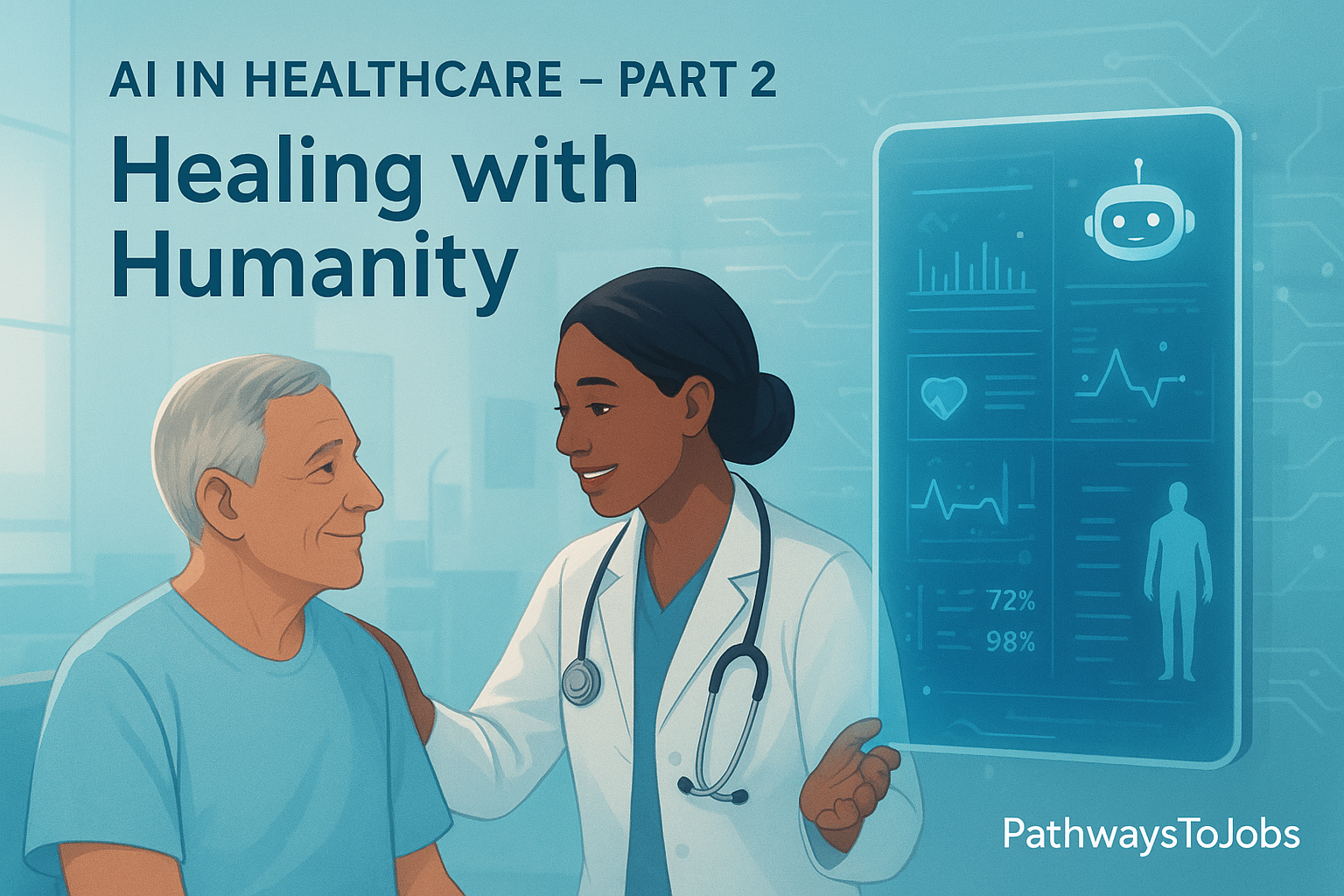Part 2: AI in Healthcare – Healing with Humanity

(From the “AI and the Future of Work” Series – Pathways to Jobs)
Artificial Intelligence (AI) is transforming the way we live — and nowhere is this transformation more profound than in healthcare. From detecting diseases earlier to helping doctors make faster, more accurate decisions, AI is saving time, saving money, and, most importantly, saving lives.
But just like in gaming and animation, AI isn’t replacing humans; it’s working with them. It handles the data, but people handle the care. And that means new opportunities for students who want to make a difference in medicine, science, or technology.
A Revolution in Care
The global healthcare AI market is projected to reach nearly $188 billion by 2030 (Precedence Research, 2024). Hospitals, labs, and even dental clinics now use AI to:
Detect diseases earlier through image recognition and pattern analysis.
Predict patient risks using data from wearables and medical records.
Personalize treatment plans for patients with chronic illnesses.
Speed up medical research by analyzing vast amounts of data.
Assist with administrative tasks, such as billing and record-keeping. AI is also helping in mental health. Chatbots and virtual assistants, powered by natural language processing, provide round-the-clock emotional support and early mental-health screening, while licensed professionals guide the care.
Human Jobs in an AI-Driven Healthcare System
AI may automate repetitive tasks, but it’s also creating new roles that blend technology and compassion. Here are some of the careers that are thriving in this new era:
Clinical Data Analyst
Use data science to uncover trends in patient outcomes and help improve hospital efficiency.
AI Medical Specialist
Design, train, and monitor AI systems that assist doctors in diagnosing and treating patients.
Biomedical Engineer
Develop the next generation of AI-powered medical devices, prosthetics, and diagnostic tools.
Health Informatics Specialist
Bridge the gap between healthcare and IT, ensuring patient data is safe, accurate, and usable.
Genomic Data Scientist
Use AI to map genetic data and predict risks for inherited diseases, helping doctors personalize treatments.
Telehealth Coordinator
Manage virtual healthcare programs and patient communication tools that use AI to triage or schedule appointments.
Ethics & Compliance Officer (AI in Medicine)
Ensure AI is used responsibly, with fairness, privacy, and patient consent at the forefront.
Mental Health AI Specialist
Work on digital therapy tools, analyzing feedback to help clinicians improve support systems.
AI has also created demand for AI educators and trainers, professionals who teach doctors, nurses, and healthcare students how to use these tools safely and effectively.
Roles That Remain Uniquely Human
Even as technology advances, some jobs cannot be automated because they rely on human touch, empathy, and ethical judgment. Careers such as:
Nursing and Patient Care – Empathy, reassurance, and human presence can’t be programmed.
Mental Health Counseling – Listening, understanding, and connecting emotionally remain irreplaceable.
Public Health and Community Care – Building trust and delivering care in real-world settings requires compassion and communication.
AI supports these roles, but it doesn’t replace the heart behind them.
How to Break In
AI in healthcare combines science, technology, and empathy. Students interested in this field can begin exploring through programs or certifications in:
Health Informatics
Biomedical Engineering
AI & Data Analytics
Nursing or Medical Laboratory Technology
Psychology or Mental Health Studies
Biotechnology
Building digital literacy, volunteering in health settings, or joining STEM and health-tech clubs can also be valuable first steps.
Best High School Courses to Prepare for This Career
Biology & Chemistry – Foundation for understanding how the human body works.
Computer Science or Coding – Learn how AI systems are built and trained.
Mathematics & Statistics – Essential for analyzing medical data.
Health Science or Anatomy – Helps connect scientific theory to patient care.
Ethics or Social Studies – Build awareness of privacy, fairness, and responsibility in technology.
English / Communications – Strengthen empathy and communication skills needed for patient interaction.
The Takeaway
AI is revolutionizing healthcare, but people remain at the heart of healing.
Technology can analyze a heartbeat, but only a person can listen with compassion.
If you’re fascinated by both science and service, this new era of healthcare may be calling you.
Because the future of medicine isn’t just artificial - it’s intelligently human.
Next Up – Part 3: AI in Business & Finance
Discover how automation and analytics are transforming the way companies operate and creating new human-led opportunities in strategy, communication, and ethics.
PathwaysToJobs.
We've got you :)